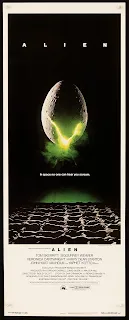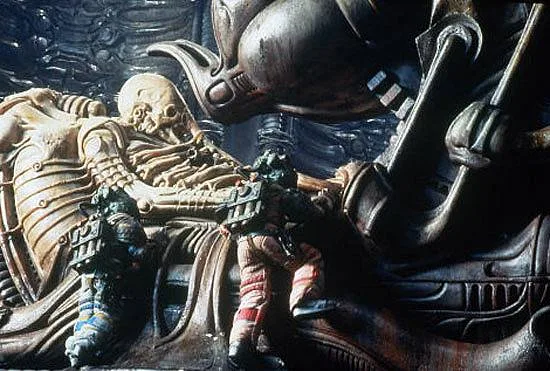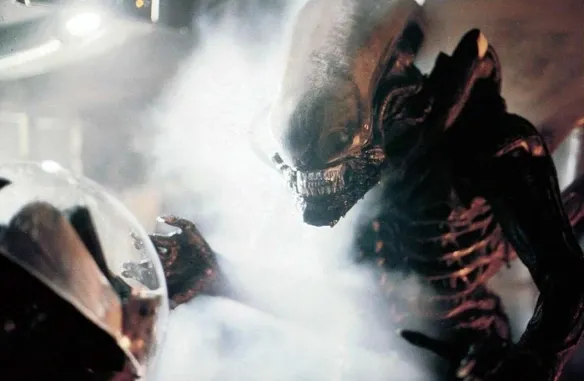From Giger's iconic design of the xenomorph creature to the unforgettable performances of Sigourney Weaver as Ellen Ripley, the films have left an indelible mark on popular culture.
Directed by Jean-Pierre Jeunet, "Alien Resurrection" took the franchise in a new direction, incorporating elements of dark comedy and body horror. While it received mixed reviews, it performed decently at the box office and has its own set of devoted fans.
 The Alien franchise serves as a complex tapestry of existential, psychological, and sociopolitical themes, all set against the backdrop of cosmic horror and survival. At its core, the series grapples with the fear of the unknown—represented by the enigmatic and terrifying xenomorphs—as well as the fragility and resilience of human life.
The Alien franchise serves as a complex tapestry of existential, psychological, and sociopolitical themes, all set against the backdrop of cosmic horror and survival. At its core, the series grapples with the fear of the unknown—represented by the enigmatic and terrifying xenomorphs—as well as the fragility and resilience of human life.
Discussions about artificial intelligence in Alien films
The Humble Beginnings: "Alien" (1979)
The Alien franchise began its journey with Ridley Scott's "Alien," released in 1979. The film was groundbreaking in many ways, from its haunting atmosphere to its iconic creature design by H.R. Giger. It was both a critical and commercial success, grossing over $100 million worldwide and winning an Academy Award for Best Visual Effects.The film introduced audiences to Ellen Ripley, portrayed by Sigourney Weaver (Ghostbusters, Avatar), who would go on to become one of cinema's most iconic heroines.
The Action-Packed Sequel: "Aliens" (1986)
James Cameron took the reins for the sequel, "Aliens," in 1986. The film took a more action-oriented approach and was another massive success, both critically and commercially. It received several Academy Award nominations and solidified the franchise as a cornerstone of science fiction cinema.The Controversial Third Installment: "Alien 3" (1992)
Directed by David Fincher, "Alien 3" had a troubled production and was met with mixed reviews upon its release. However, it has gained a cult following over the years and is appreciated for its darker tone and thematic depth, particularly its exploration of religious elements.The Experimental Chapter: "Alien Resurrection" (1997)
The Prequel Saga: "Prometheus" (2012) and "Alien: Covenant" (2017)
Ridley Scott returned to the franchise with "Prometheus" in 2012, aiming to explore the origins of the xenomorphs and the mysterious Engineers. The film was followed by "Alien: Covenant" in 2017. Both films received mixed to positive reviews and performed well at the box office, but they sparked debates among fans regarding their place in the Alien canon.The Themes of the Alien films
 The Alien franchise serves as a complex tapestry of existential, psychological, and sociopolitical themes, all set against the backdrop of cosmic horror and survival. At its core, the series grapples with the fear of the unknown—represented by the enigmatic and terrifying xenomorphs—as well as the fragility and resilience of human life.
The Alien franchise serves as a complex tapestry of existential, psychological, and sociopolitical themes, all set against the backdrop of cosmic horror and survival. At its core, the series grapples with the fear of the unknown—represented by the enigmatic and terrifying xenomorphs—as well as the fragility and resilience of human life.
Themes of isolation and vulnerability are often juxtaposed with the indomitable will to survive, embodied by characters like Ellen Ripley. The franchise also delves into the ethics and dangers of artificial intelligence, the complexities of creation and destruction, and the hubris of humanity in its quest for knowledge and power.
Religious and philosophical undertones permeate the narrative, inviting audiences to ponder questions of morality, divinity, and the nature of existence itself.
- Themes of the Alien film (1979)
- Themes of James Cameron's Aliens sequel
- Themes of Alien 3
- Themes of Alien Prometheus
- Themes of Alien Covenant
- Themes of Alien Ressurection
- Themes of Alien Romulus
The 1979 film "Alien," directed by Ridley Scott, is nothing short of a cinematic revelation, a tour de force that forever altered the landscape of science fiction and horror. With its hauntingly atmospheric visuals, courtesy of H.R. Giger's nightmarish designs, and Jerry Goldsmith's spine-chilling score, the film plunges us into an abyss of existential dread.
The Nostromo, a commercial spaceship, becomes a labyrinthine chamber of horrors, a microcosm of humanity's deepest fears and vulnerabilities. At the center of this cosmic ballet of terror stands Ellen Ripley, portrayed by Sigourney Weaver in a career-defining role, embodying both the fragility and indomitable will of the human spirit.
The film's tagline, "In space, no one can hear you scream," encapsulates its essence—a chilling exploration of isolation, the unknown, and the relentless pursuit of survival against an unfathomable alien terror. "Alien" is not just a film; it's an experience, a psychological odyssey that transcends genre boundaries and continues to captivate, terrify, and inspire, more than four decades after its release.
Aliens
James Cameron's 1986 sequel, "Aliens," is a monumental achievement that not only honors its predecessor but also carves its own indelible mark in the annals of science fiction and action cinema. Where the original "Alien" was a claustrophobic ballet of horror, "Aliens" is an adrenaline-fueled opera of survival, camaraderie, and maternal instinct. Sigourney Weaver returns as Ellen Ripley, this time not as a lone survivor but as a reluctant warrior-mother, leading a cadre of Colonial Marines against an entire hive of xenomorphs.The film is a masterclass in escalating tension, punctuated by moments of genuine emotion and character development. It introduces us to unforgettable characters like Corporal Hicks and Private Hudson, and gives us one of cinema's most iconic lines: "Get away from her, you bitch!"
The thematic depth—exploring the cost of corporate greed, the trauma of survival, and the complexities of motherhood—elevates "Aliens" from mere sequel to a standalone masterpiece. It's a rollercoaster of thrills and heart, a film that manages to expand the Alien universe while staying true to its core essence.
Alien 3
"Alien 3" stands as a divisive yet deeply thematic installment in the Alien franchise. Set in a penal colony on the planet Fiorina 161, the film explores themes of isolation, despair, and the search for redemption in a godless world. Ellen Ripley, the saga's enduring protagonist, finds herself not only battling another lethal xenomorph but also confronting existential questions in a desolate setting devoid of hope.
The film delves into religious motifs, most notably through the colony's population of religious converts who view the xenomorph as a form of divine retribution. Additionally, the troubled production of "Alien 3" has become almost as legendary as the film itself, adding a layer of real-world struggle to its complex narrative.
The film delves into religious motifs, most notably through the colony's population of religious converts who view the xenomorph as a form of divine retribution. Additionally, the troubled production of "Alien 3" has become almost as legendary as the film itself, adding a layer of real-world struggle to its complex narrative.
Despite its polarizing reception, "Alien 3" offers a rich tapestry of themes that contribute to the franchise's ongoing dialogue on humanity's place in a vast, indifferent universe.
- The religious elements of Alien 3
- Ripley and Clemons
- The troubled production of Alien 3
- How Alien 3 became a cult classic sci-film
- Why did the alien xenomorph take so long to gestate in Ellen Ripley?
Alien Ressurection
"Alien Resurrection," the fourth installment in the Alien franchise, directed by Jean-Pierre Jeunet, takes the series into uncharted thematic waters. Set 200 years after the events of "Alien 3," the film sees the cloning of Ellen Ripley, along with the xenomorph DNA inside her, by military scientists aiming to weaponize the aliens.The plot explores themes of identity, rebirth, and the ethical implications of cloning and genetic manipulation. Ripley's clone, now possessing some of the xenomorphs' traits, finds herself in a moral and existential quandary, torn between her human and alien sides. The film also delves into the idea of monstrous motherhood, as exemplified by the grotesque relationship between the cloned Ripley and the xenomorphs.
Additionally, "Alien Resurrection" incorporates elements of dark comedy and body horror, making it a unique, albeit polarizing, entry in the franchise. The film challenges the audience to confront uncomfortable ethical questions while offering a fresh take on the series' enduring themes of survival and identity.
The Alien prequel films: "Prometheus" and "Alien: Covenant"
These films serve as intriguing prequels to the original Alien saga, diving deep into existential questions and cosmic origins. While "Prometheus" explores the hubris of mankind in its quest for the divine, symbolized by the Engineers who serve as god-like figures, "Covenant" delves into the darker aspects of creation and destruction.
Themes of life, death, and rebirth are interwoven with a critique of artificial intelligence, epitomized by David, the synthetic being with a God complex. Both films challenge the boundaries of human ethics and scientific ambition, set against the backdrop of a universe that is as indifferent as it is mysterious.
Together, they offer a complex tapestry of themes that enrich the Alien franchise, adding layers of philosophical and ethical dimensions to the cosmic horror and survival elements that fans have come to love.
- Who are the Engineers in Prometheus?
- David the AI and the xenomorph creation
- The twist ending of Covenant explained
- What is the black ooze the Engineers use to create life?
- David's God Complex
- Peter Weyland's hubris leading to his downfall
- Why are the characters so stupid in Prometheus?
Alien: Romulus
Directed by Fede Álvarez (Evil Dead) and co-written with Rodo Sayagues, the film is described as an "original stand-alone" entry that is unconnected to the previous films in the series. The plot centers around a group of young people on a distant world who find themselves confronting the most terrifying life form in the universe—the xenomorph.The film stars Cailee Spaeny, David Jonsson, Archie Renaux, Isabela Merced, Spike Fearn, and Aileen Wu.
The title "Romulus" may hint at themes of foundation and leadership, as Romulus was the legendary founder and first king of Rome. Ridley Scott serves as an executive producer, adding another layer of anticipation for what promises to be a thrilling addition to the franchise.
- Review of Alien Romulus
- How is the Romulus film connected to the Alien films as canon?
- Ellen Ripley's Narcissus Easter Egg explained
Alien Earth: TV Show
The series is set in the year 2120, two years before the events of the film Alien, and decades before the birth of Ellen Ripley. It takes place on Earth and follows a diverse cast of characters as they confront the arrival of the Xenomorphs for the first time.
The show focuses on the intense rivalry between powerful corporations vying for control of alien lifeforms and advanced technologies. At its core, "Alien: Earth" is a story about humanity's struggle against both the monstrous alien threat and the inhumanity of its own social systems.
- Episode 1 review: A spaceship crash-lands on Earth, and a young woman named Wendy, a "hybrid" with a child's consciousness in a synthetic adult body, is sent with a group of soldiers to investigate. This episode establishes the show's premise and introduces the main characters. Epsiode 2: Mr October Review - The title itself is a piece of grim corporate irony, suggesting a game-changing "clutch player" has entered the field: not a celebrated athlete, but a perfect organism that every major power is now desperate to control.
- Episode 3: Alien Earth: Metamorphisis: The team returns from the crash site with unexpected alien cargo. An unsettling experiment takes place, and a new, dangerous talent is discovered among the captured creatures.
- Episode 4 review: Observation: An unexpected connection forms between two characters, while a covert plot puts everyone in danger. This episode further develops the corporate espionage storyline.
- Episode 5: In Space, No One...:This episode focuses on the backstory of the crashed spaceship, the USCSS Maginot. It shows the crew's final terrifying hours and provides a more sympathetic look at the character of Morrow.
- Epsiode 6: The Fly Review:Tensions rise as powerful enemies confront each other. A dangerous plan unfolds, and curiosity leads to deadly consequences, including the deaths of two characters at the calculations of a mutated alien sheep. The episode ends with a main character being captured by a facehugger, setting up a dramatic future for the series.
- Episode 7: Emergence: The aftermath of the facehugger attack results in a violent and horrifying birth, unleashing a new creature inside the facility. Galvanized by loss, Wendy makes a shocking alliance, taming the Xenomorph and turning it into a weapon. This episode marks a major power shift as the characters are pushed past their breaking points.
- Episode 8: The Real Monsters: Wendy and the hybrids decide to stop playing by the rules. A violent uprising shatters old alliances, and the episode culminates in a stunning reversal of power that questions who the real monsters truly are
To ponder:
- When is Alien Earth set in the Alien franchise chronology?
- What are the Companies of Alien Earth?
- What do the Peter Pan references mean?
- What does the name of Boy Kavalier mean?
- The metaphor of the Scorpion explained
- How Morrow communciates with Slightly
- How Wendy's child hubris will be her downfall
- Alien Earth's thematic perspective of fatherhood




















